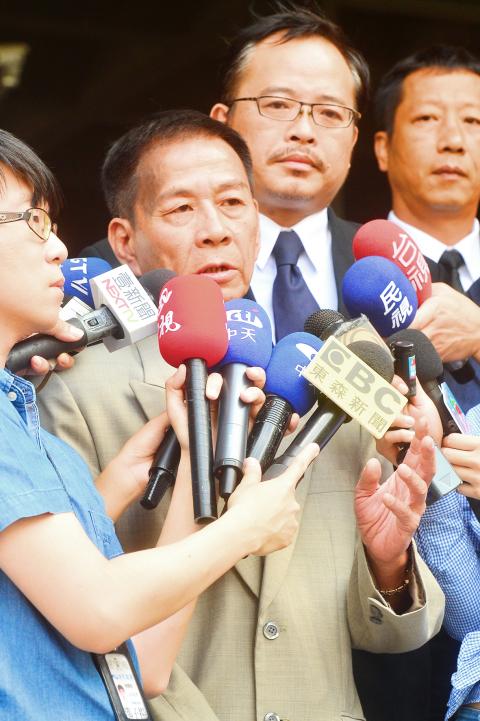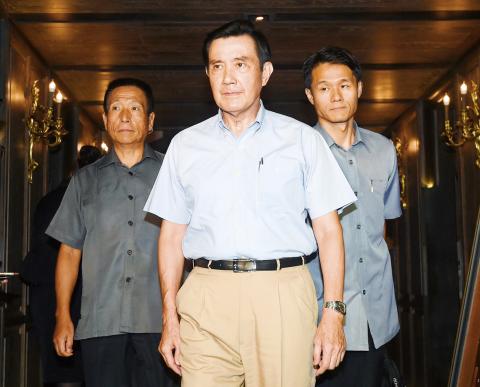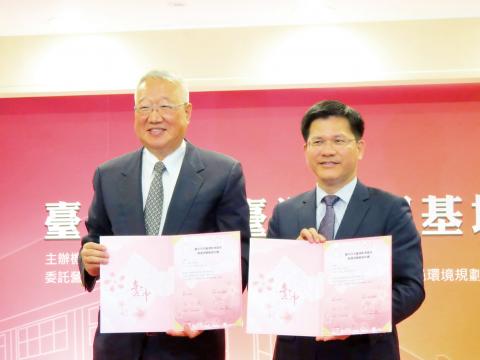Weng Ping-yao (翁炳堯) yesterday said he was instructed by former president Ma Ying-jeou (馬英九) and Cheng Uei Precision Industry Co (CUPI, 正崴) chairman Gou Tai-chiang (郭台強) to kill then-Chinese Nationalist Party (KMT) legislator Alex Tsai (蔡正元) amid a power struggle a decade ago as groups fought for control of the party’s assets.
Weng — who was convicted of firing a gun outside Tsai’s office in Taipei’s Nangang District (南港) on July 28, 2007 — said that KMT officials promised him NT$320 million (US$10.56 million at the current exchange rate) to kill the lawmaker.
He implicated Ma and Gou — who is the younger brother of Hon Hai Precision Industry Co (鴻海精密) chairman Terry Gou (郭台銘); — as well as Lor Yu-chen (羅玉珍), the wife of Gou Tai-chiang; former Central Motion Picture Corp (CMPC, 中影) vice president Chuang Wan-chun (莊婉均); and KMT stalwart Lee Chuan-chiao (李全教).

Photo: Wang Yi-sung, Taipei Times
Accompanied by attorney Chou Wu-jung (周武榮), Weng went to the Taipei District Prosecutors’ Office, saying he wanted to confess to perjury and to ask prosecutors to reopen the investigation of the shooting.
Weng said he has evidence regarding “the plot to bump off Alex Tsai.”
After telling reporters that he would file a lawsuit against “the masterminds of the plot,” Weng entered the prosecutors’ office.

Photo: Liao Chen-huei, Taipei Times
He was released later in the day, with instructions not to leave his residence.
Weng told reporters that he was just “a hired gun, a small potato” in the case and wanted the truth to come out.
The KMT at the time of the shooting was electing members to its Central Standing Committee and other executive positions.

Photo: Su Chin-feng, Taipei Times
There was an intense power struggle over party assets, with the sale of CMPC and other KMT-controlled media companies at the center of a clash between Ma, who was president and KMT chairman at the time, and Tsai, who was the chairman of CMPC at the time, Weng said.
“Tsai refused to resign as CMPC chairman, so Ma struck a deal with Gou Tai-chiang, Lor and Chuang according to which those three would take control of CMPC,” Weng said.
“I was instructed to bump off Tsai,” he said. “It was reasoned that if Tsai was killed, then Gou Tai-chiang would become CMPC chairman.”
Weng said that Lee, who at the time was speaker of the Tainan County Council, brokered the deal to hire him to carry out the assassination.
Weng has a checkered past as a gang member in Tainan and has managed companies in Vietnam.
“I was promised a payment of NT$320 million if I killed Tsai,” he said. “That amount was agreed upon, as it was 10 percent of CMPC’s assessed value of NT$3.2 billion.”
He said the deal broke down when he was asked to also kill Wu Chien-pao (吳健保), a leading KMT figure in Tainan, but was convicted for his involvement in an underground baseball gambling syndicate.
With the deal breaking down, Weng only fired shots at Tsai’s office, he said.
He said he was cheated out of money, only receiving NT$20 million.
“During the trial, I gave false accounts and mislead prosecutors to protect Ma, Gou Tai-chiang and others, but now I want to clear up the facts of the case and let the public know the real masterminds behind the plot,” Weng said.
Ma’s office spokeswoman Hsu Chiao-hsin (徐巧芯) said there is no factual basis and no evidence to Weng’s allegations, adding that Ma had nothing to do with the shooting incident at Tsai’s office.
“It is absurd to the extreme that Ma should be a defendant in this case,” Hsu said. “Ma was not involved, but some people just want to stir up trouble.”

CHAOS: Iranians took to the streets playing celebratory music after reports of Khamenei’s death on Saturday, while mourners also gathered in Tehran yesterday Iranian Supreme Leader Ayatollah Ali Khamenei was killed in a major attack on Iran launched by Israel and the US, throwing the future of the Islamic republic into doubt and raising the risk of regional instability. Iranian state television and the state-run IRNA news agency announced the 86-year-old’s death early yesterday. US President Donald Trump said it gave Iranians their “greatest chance” to “take back” their country. The announcements came after a joint US and Israeli aerial bombardment that targeted Iranian military and governmental sites. Trump said the “heavy and pinpoint bombing” would continue through the week or as long

TRUST: The KMT said it respected the US’ timing and considerations, and hoped it would continue to honor its commitments to helping Taiwan bolster its defenses and deterrence US President Donald Trump is delaying a multibillion-dollar arms sale to Taiwan to ensure his visit to Beijing is successful, a New York Times report said. The weapons sales package has stalled in the US Department of State, the report said, citing US officials it did not identify. The White House has told agencies not to push forward ahead of Trump’s meeting with Chinese President Xi Jinping (習近平), it said. The two last month held a phone call to discuss trade and geopolitical flashpoints ahead of the summit. Xi raised the Taiwan issue and urged the US to handle arms sales to

BIG SPENDERS: Foreign investors bought the most Taiwan equities since 2005, signaling confidence that an AI boom would continue to benefit chipmakers Taiwan Semiconductor Manufacturing Co’s (TSMC, 台積電) market capitalization swelled to US$2 trillion for the first time following a 4.25 percent rally in its American depositary receipts (ADR) overnight, putting the world’s biggest contract chipmaker sixth on the list of the world’s biggest companies by market capitalization, just behind Amazon.com Inc. The site CompaniesMarketcap.com ranked TSMC ahead of Saudi Aramco and Meta Platforms Inc. The Taiwanese company’s ADRs on Tuesday surged to US$385.75 on the New York Stock Exchange, as strong demand for artificial intelligence (AI) applications led to chip supply constraints and boost revenue growth to record-breaking levels. Each TSMC ADR represents

State-run CPC Corp, Taiwan (CPC, 台灣中油) yesterday said that it had confirmed on Saturday night with its liquefied natural gas (LNG) and crude oil suppliers that shipments are proceeding as scheduled and that domestic supplies remain unaffected. The CPC yesterday announced the gasoline and diesel prices will rise by NT$0.2 and NT$0.4 per liter, respectively, starting Monday, citing Middle East tensions and blizzards in the eastern United States. CPC also iterated it has been reducing the proportion of crude oil imports from the Middle East and diversifying its supply sources in the past few years in response to geopolitical risks, expanding